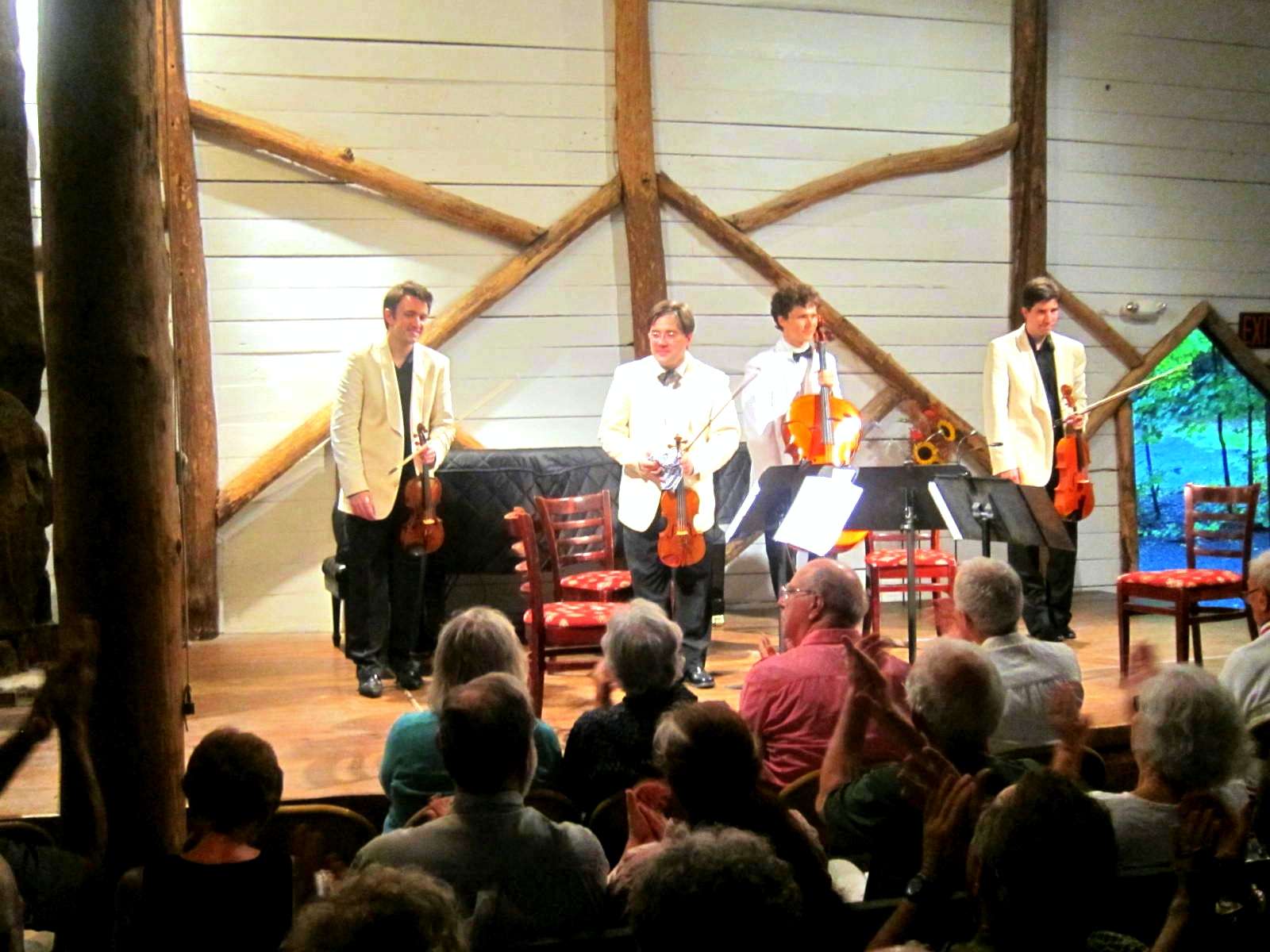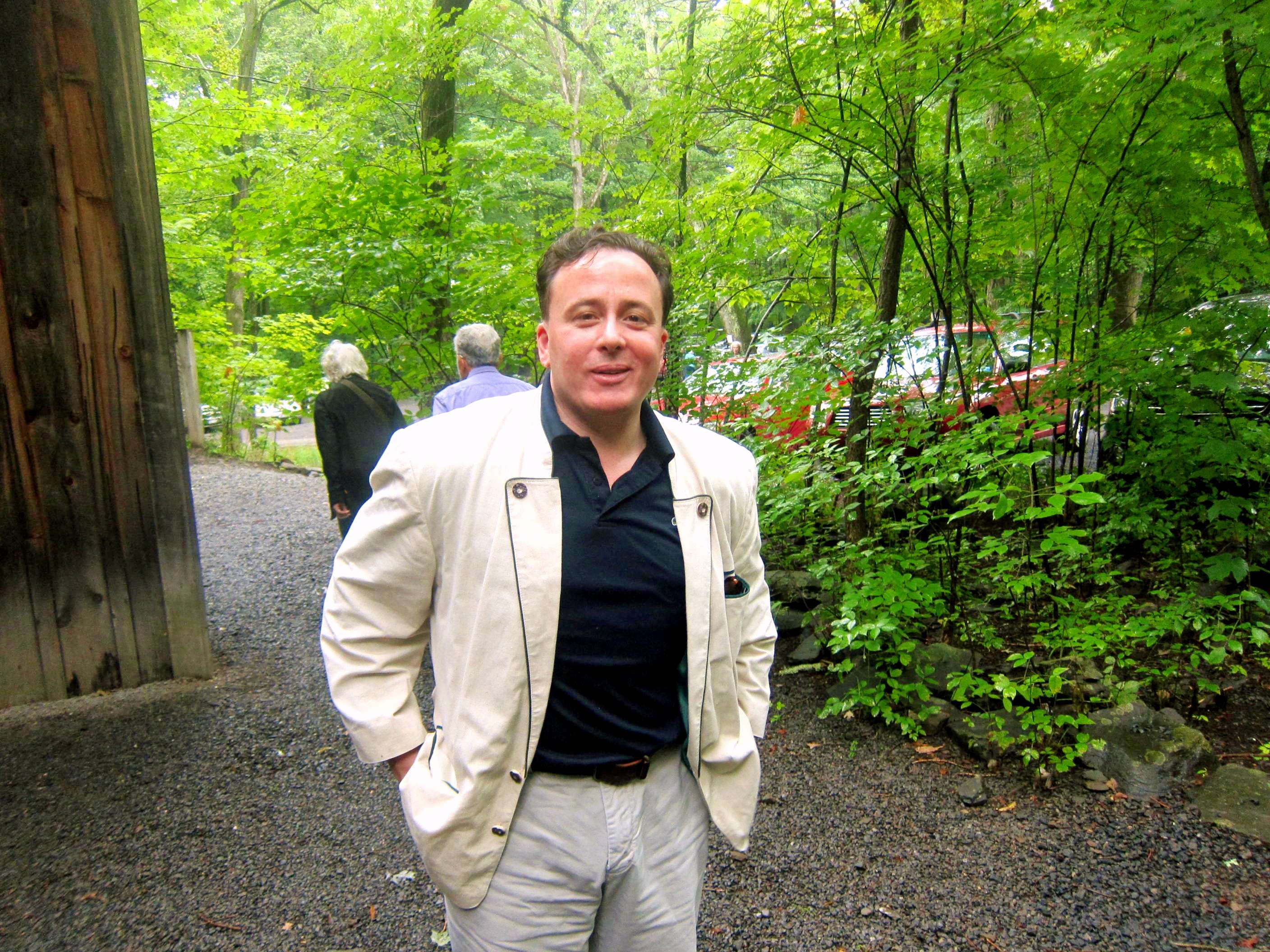|
Back
20th Century Time Traveling New York
Maverick Concert Hall, Woodstock
07/28/2013 -
Sir Edward Elgar: String Quartet in E Minor, Opus 83
Lord Benjamin Britten: String Quartet No. 3, Opus 94
Sir Harrison Birtwistle: Music from Nine Movements for String Quartet
Ludwig van Beethoven: String Quartet No. 16 in F Major, Opus 135
Escher String Quartet: Adam Barnett-Hart, Aaron Boyd (Violins), Pierre Lapointe (Viola), Dane Johansen (Cello)

The Escher Quartet (© Coco. T. Dog)
In its 98–yes, ninety-eight!–years as the classical music festival in Woodstock, New York, the Maverick Festival has every right in the to celebrate its most noted resident composer.
That was Benjamin Britten, who, with Aaron Copland and Peter Pears, spent the summer of 1939 in this verdant area, performing, writing and sojourning amidst the forests and villages of the area. Thus, this centenary of Baron Benjamin of Aldeburgh, was a good time to perform some of the rare chamber works of the composer.
Yesterday’s concert through, was even more significant. For, perhaps coincidentally, the Escher Quartet was celebrating the inner history of the 20th Century. With Sir Edward Elgar’s pretty-pretty sole String Quartet, despite First World War, the world was a place of flowers and gingerbread, dancing and sunshine. With Britten’s final complete work, that English garden was a creation of his mind, weeds and all. And with the excerpts (alas) from Harrison Birtwistle’s music for the poet Paul Celan, we heard that the gardens and society and self could still survive, after shattering, shaking and dissolution.
The final Beethoven last quartet was, retroactively, a summation of all.
At any rate, the Escher Quartet, with a new second violinist, Aaron Boyd, has the youth, the excitement and above all the humanity to make those works live. Within the barn-like atmosphere of Maverick concert hall–the wooden beams, the bright windows and open doorways leading to the greenery outside–the sounds are truer than virtually any other concert hall. This is no church for resonance, this has no arid dryness. The sounds are clear, every click every soft drumming on the strings, any errors (though I heard none) would have been part of the aural atmosphere.
(One realizes that John Cage’s 4’33”, which was premiered here, would have included the rustling trees, the bird sounds, the occasional drop of a program.)
The Escher Quartet were, above all, four players of supreme energy. One gags at the thought of the “captured sunshine” second movement, but the group had a fullness of sound and a volition which eschewed mere pictorialism. Lady Elgar was probably right in saying that part of the work was the “galloping of horses” for Sir Edward did love the races. More important was that, without gimmicks, giving full credit to the composer’s anthem-like climaxes, the Escher gave the piece a rare energy.
The Britten was personally tragic. While dying, the composer was longing to write orchestral music, but was unable to handle a full page of orchestral music. This String Quartet, including a few themes from his last opera, Death in Venice was anything but the last testament of a dying man. In fact, it was almost whimsical.
Was he imitating Béla Bartók in his movement of duets? Possibly, but the main point was that the Escher Quartet never made a gimmick from the buffet of two-instrument sounds. Britten also was perhaps also giving homage to a Baroque vision of music, with an ostinato, a passacaglia, a recitative and a work for solo violin. Adam Barnett-Hart started slowly here, but as the background grew with various string techniques, almost oblivious of the violin, it became even most flurried, more the work of a man trying to make sense of his own music.
One cannot compare the mysterious last movement to anything else. (Except possibly Shostakovich’s final Viola Sonata with its chords of the “Moonlight” Sonata.) It is serene, yes, but with the Escher performance, an unhurried walk. The difference was that the walk comes to an end. This movement ended with a...
With nothing. No resolution. We make our own answers.

A. Platt (© Coco T. Dog)
A confession: I had warned my guests that Harrison Birtwistle’s work might be...er, a bit difficult for neophyte ears. Thanks to the comprehensive, anecdotal understanding by the noted conductor and Music director of Maverick, Alexander Platt, no warnings were necessary.
Oh, how I would have loved hearing the original Celan poems translated and read between these three movements. But one takes what is given, and Birtwistle gave music which slashed, burned, seared and fell right into the last 20th Century writhings. A lopsided a waltz, series of searing chords, a beautiful viola solo, more slash-and burn. I needed much more. Perhaps next time.
The Beethoven Opus 135, like the Britten, is no heavy “farewell to life.” This is Beethoven showing, as Mahler said, the whole world. We had the buzzing jokes of the Ninth, as well as a tranquil slow movement. A finale which literally spoke what Beethoven had asked: “Must it be? Must it be?”
Like everything else yesterday, the Escher never pushed the music, never went over the barlines to make their points. Yes, they have their own personalities when necessary. But this Beethoven Quartet speaks for itself, and with the Escher Quartet, the words were not only transparent and allowed us to create our own meanings.
CODA: Maverick has no less than 14 more weekend concerts this year, featuring Britten and dozens of other composer. To get the full list, go to www.maverickconcerts.org.
Harry Rolnick
|